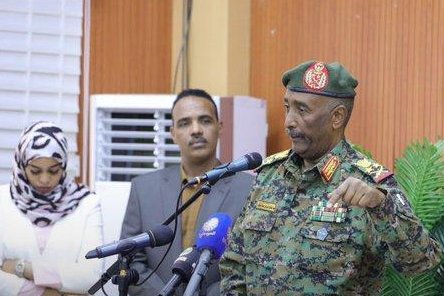Gen. Abdel Fattah al-Burhan (C), leader of the Sudanese Armed Forces and president of the Transitional Sovereign Council, speaks following a meeting Saturday of political leaders concerning a new transitional government. Photo courtesy of Sudan Transitional Sovereign Council/
XFeb. 10 (UPI) — Sudan’s foreign ministry has unveiled a post-war roadmap toward establishing democratic elections in a country ravaged by nearly two years of civil war, while calling on the international community to support its transition plans.
The announcement comes as the Sudanese Armed Forces has made significant gains against the paramilitary Rapid Support Forces. Gen. Abdel Fattah al-Burhan, leader of the Sudanese Armed Forces and president of the Transitional Sovereign Council, announced on Saturday that a new government would be formed.
In its statement Sunday, the ministry said the roadmap establishes the “post-war phase” of the country and the resumption of “the inclusive political process that will culminate in holding free and fair general elections.”
A comprehensive national dialogue involving all political and societal forces, the selection of a civilian prime minister to lead the executive branch, constitutional amendments and the forming of a cabinet to lead transitional efforts were included in the roadmap.
The transition will allow free speech and political activities, provided they do not threaten national security, the ministry said, adding that no citizen will be denied the right to obtain a passport.
“The ministry of Foreign Affairs, therefor, calls on the International community, especially the African Union, the United Nations and the Arab League, to support the roadmap as it represents a national consensus for restoring peace and stability in the country and satisfying requirements of the democratic transition,” it said, adding that the roadmap was put forward following “extensive consultations with national and societal components.
The announcement comes a day after al-Burhan announced during a meeting with national and community political forces that there would be a transitional government, consisting of independent experts.
A statement from his office says: “The upcoming period will witness the formation of a new government to complete the tasks of transition.”
Described as either a “caretaker” or “wartime” government, its purpose will be to assist in completing military operations, including “clearing all of Sudan of these rebels.”
Al-Burhan, as chairman of the council, states he reaffirms his determination to move forward in building a Sudanese state.
“The government will carry out its duties in managing the executive apparatus of the state without interference in the selection of the president,” the statement said.
Sudan was ruled by dictator President Omar al-Bashir for some three decades until he was ousted in a civilian-backed coup in 2019.
As the country crawled toward establishing a democratic government, al-Burhan and his then-deputy, Mohammad Hamdan of the RSF, executed another coup, but infighting between them erupted into full-blown conflict on April 15, 2023.
The civil war has devastated the country: Tens of thousands have been killed, more than 11 million have been displaced and more than 24.6 million, half of Sudan’s population, are facing high levels of food insecurity.
It’s unclear exactly how many people have been killed, with estimates ranging widely. U.S. Special Envoy for Sudan Tom Perriello said in May that it could be as high as 150,000. In September, World Health Organization Director-General Tedros Adhanom Ghebreyesus said data indicated more than 20,000 had been killed, but stated that was an underestimation.
Both sides have been accused of committing war crimes in the conflict, with the United States last month declaring the RSF and its proxy militias were guilty of genocide.
Sudan’s foreign ministry said Sunday that prerequisites for cease-fire talks with the rebel factions include a stop to its ongoing siege of Al-Fashir city in North Darfur, followed by the withdrawal of its troops from the country’s capital of Khartoum as well as West Kordofan province and the states of Darfur.
